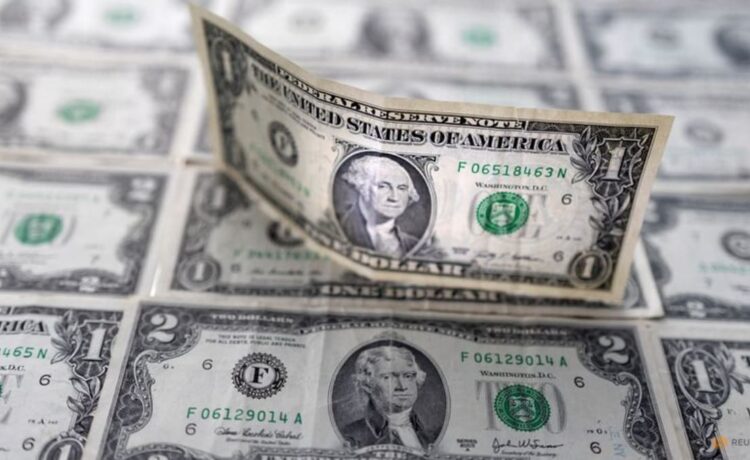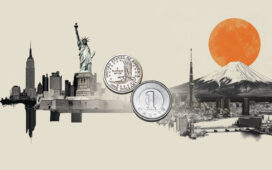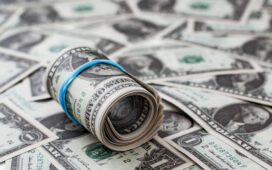LONDON :The U.S. dollar was steady on Friday, but still on course for a modest weekly gain against major rivals, as investors braced for delayed inflation data that is unlikely to deter the Federal Reserve from lowering interest rates next week.
Trade war worries were back on the agenda after U.S. President Donald Trump said all trade talks with Canada were terminated following what he called a fraudulent advertisement by the province of Ontario in which former President Ronald Reagan spoke negatively about tariffs.
The Canadian dollar eased a touch to 1.4020 per U.S. dollar, but market reaction overall was fairly subdued. Investors’ focus remained on the looming meeting between Trump and Chinese President Xi Jinping next week and today’s inflation figures.
HOPES FOR PROGRESS IN TRUMP-XI TALKS
The proposed Trump-Xi meeting in South Korea has spurred some expectations of a resolution to the on-again-off-again trade war between the world’s top two economies.
“I think expectations are quite high for the Trump-Xi meeting, with the upside risk of a significant de-escalation following the face-to-face meeting,” said Ben Bennett, head of investment strategy for Asia at L&G Asset Management.
“Investors are getting used to the process of aggressive statements followed by compromise and headline deals, so hopefully this is another example. The Canada escalation could also be part of a deal process.”
US INFLATION DATA AT LAST
Investors are watching out for the U.S. Consumer Price Index for September, due later on Friday despite the government shutdown entering its third week. Economists polled by Reuters expect a 0.4 per cent monthly increase for the headline number and a 0.3 per cent rise in the core figure.
While analysts do not expect the data to hinder the Fed’s path to cutting rates next week by 25 basis points, it could provide cues on what the central bank might do in its December meeting.
Traders are almost fully pricing in a rate cut next week and another one at the December meeting.
“It’s obviously important because we haven’t had any official data for a while so I think the market will place slightly more importance on this than they might normally,” said Dominic Bunning, head of G10 FX strategy at Nomura.
The euro was down about 0.1 per cent at $1.1608, poised for a 0.3 per cent drop for the week. Business activity in the euro zone grew at a faster pace than expected in October, led by the bloc’s services industry, a survey showed on Friday.
Sterling was down 0.1 per cent at $1.3311, despite stronger-than-expected retail sales that were boosted by demand for gold from online jewellers. It was down about 1 per cent this week after soft inflation data had investors adding to expectations for a rate cut from the Bank of England this year.
The dollar index, which measures the U.S. currency against six other units, was set for a 0.5 per cent rise for the week. It was last up 0.1 per cent at 99.06.
TAKING STOCK OF NEW SANCTIONS
New U.S. sanctions on Russian suppliers Rosneft and Lukoil over Russia’s war in Ukraine pushed up oil prices, after Britain sanctioned the same two companies last week.
That weighed on currencies tied to oil imports, including the yen. The yen’s performance is also linked to the policies of Japan’s new Prime Minister Sanae Takaichi, widely viewed as a fiscal and monetary dove.
The Japanese yen weakened to a two-week low and last fetched 152.85 per U.S. dollar. Data earlier on Friday showed Japan’s core consumer prices stayed above the central bank’s 2 per cent target, keeping alive expectations of a near-term rate hike.
Takaichi is preparing an economic stimulus package that is likely to exceed last year’s $92 billion to help households tackle inflation, government sources familiar with the plan told Reuters on Wednesday.
That may prove to be a hurdle for the Bank of Japan to hike interest rates next week, with traders ascribing only a 19 per cent chance of an increase.
“We have a risk of looser fiscal and relatively loose monetary policy coming together, and undermining the value of the yen over time,” Nomura’s Bunning said.
“It’s hard to make the case that we’re getting a massive shift towards a more positive yen story at the moment.”




